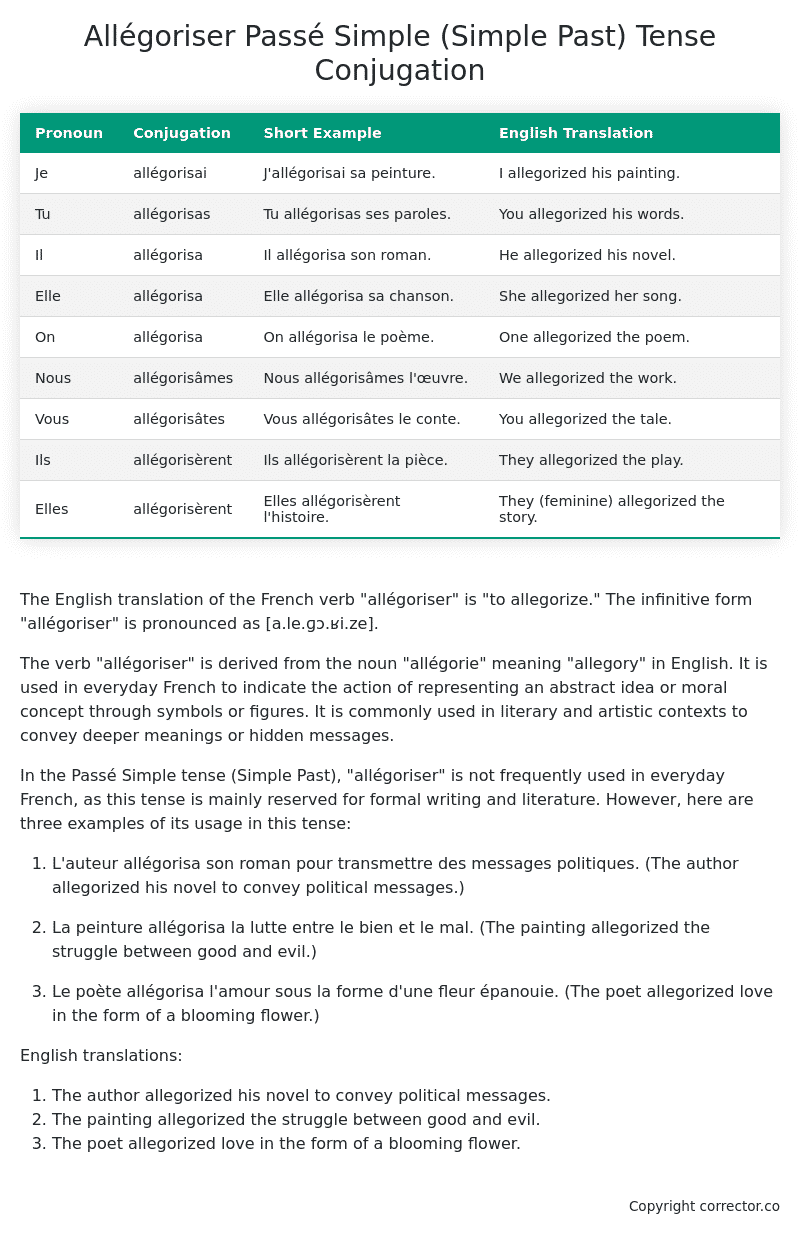Passé Simple (Simple Past) Tense Conjugation of the French Verb allégoriser
Introduction to the verb allégoriser
The English translation of the French verb “allégoriser” is “to allegorize.” The infinitive form “allégoriser” is pronounced as [a.le.ɡɔ.ʁi.ze].
The verb “allégoriser” is derived from the noun “allégorie” meaning “allegory” in English. It is used in everyday French to indicate the action of representing an abstract idea or moral concept through symbols or figures. It is commonly used in literary and artistic contexts to convey deeper meanings or hidden messages.
In the Passé Simple tense (Simple Past), “allégoriser” is not frequently used in everyday French, as this tense is mainly reserved for formal writing and literature. However, here are three examples of its usage in this tense:
-
L’auteur allégorisa son roman pour transmettre des messages politiques.
(The author allegorized his novel to convey political messages.) -
La peinture allégorisa la lutte entre le bien et le mal.
(The painting allegorized the struggle between good and evil.) -
Le poète allégorisa l’amour sous la forme d’une fleur épanouie.
(The poet allegorized love in the form of a blooming flower.)
English translations:
- The author allegorized his novel to convey political messages.
- The painting allegorized the struggle between good and evil.
- The poet allegorized love in the form of a blooming flower.
Table of the Passé Simple (Simple Past) Tense Conjugation of allégoriser
| Pronoun | Conjugation | Short Example | English Translation |
|---|---|---|---|
| Je | allégorisai | J’allégorisai sa peinture. | I allegorized his painting. |
| Tu | allégorisas | Tu allégorisas ses paroles. | You allegorized his words. |
| Il | allégorisa | Il allégorisa son roman. | He allegorized his novel. |
| Elle | allégorisa | Elle allégorisa sa chanson. | She allegorized her song. |
| On | allégorisa | On allégorisa le poème. | One allegorized the poem. |
| Nous | allégorisâmes | Nous allégorisâmes l’œuvre. | We allegorized the work. |
| Vous | allégorisâtes | Vous allégorisâtes le conte. | You allegorized the tale. |
| Ils | allégorisèrent | Ils allégorisèrent la pièce. | They allegorized the play. |
| Elles | allégorisèrent | Elles allégorisèrent l’histoire. | They (feminine) allegorized the story. |
Other Conjugations for Allégoriser.
Le Present (Present Tense) Conjugation of the French Verb allégoriser
Imparfait (Imperfect) Tense Conjugation of the French Verb allégoriser
Passé Simple (Simple Past) Tense Conjugation of the French Verb allégoriser (You’re reading it right now!)
Passé Composé (Present Perfect) Tense Conjugation of the French Verb allégoriser
Futur Simple (Simple Future) Tense Conjugation of the French Verb allégoriser
Futur Proche (Near Future) Tense Conjugation of the French Verb allégoriser
Plus-que-parfait (Pluperfect) Tense Conjugation of the French Verb allégoriser
Passé Antérieur (Past Anterior) Tense Conjugation of the French Verb allégoriser
Futur Antérieur (Future Anterior) Tense Conjugation of the French Verb allégoriser
Subjonctif Présent (Subjunctive Present) Tense Conjugation of the French Verb allégoriser
Subjonctif Passé (Subjunctive Past) Tense Conjugation of the French Verb allégoriser
Subjonctif Imparfait (Subjunctive Imperfect) Tense Conjugation of the French Verb allégoriser
Conditionnel Présent (Conditional Present) Tense Conjugation of the French Verb allégoriser
Conditionnel Passé (Conditional Past) Tense Conjugation of the French Verb allégoriser
Conditionnel Passé II (Conditional Past II) Tense Conjugation of the French Verb allégoriser
L’impératif Présent (Imperative Present) Tense Conjugation of the French Verb allégoriser
L’impératif Passé (Imperative Past) Tense Conjugation of the French Verb allégoriser
L’infinitif Présent (Infinitive Present) Tense Conjugation of the French Verb allégoriser
L’infinitif Passé (Infinitive Past) Tense Conjugation of the French Verb allégoriser
Le Participe Présent (Present Participle) Tense Conjugation of the French Verb allégoriser
Le Participe Passé (Past Participle) Tense Conjugation of the French Verb allégoriser
Struggling with French verbs or the language in general? Why not use our free French Grammar Checker – no registration required!
Get a FREE Download Study Sheet of this Conjugation 🔥
Simply right click the image below, click “save image” and get your free reference for the allégoriser Passé Simple tense conjugation!

Allégoriser – About the French Passé Simple (Simple Past) Tense
Formation
Usage
Narration
Historical Context
Interactions with other tenses
Passé Composé
Imparfait
Conditional and Subjunctive
Summary
I hope you enjoyed this article on the verb allégoriser. Still in a learning mood? Check out another TOTALLY random French verb conjugation!


